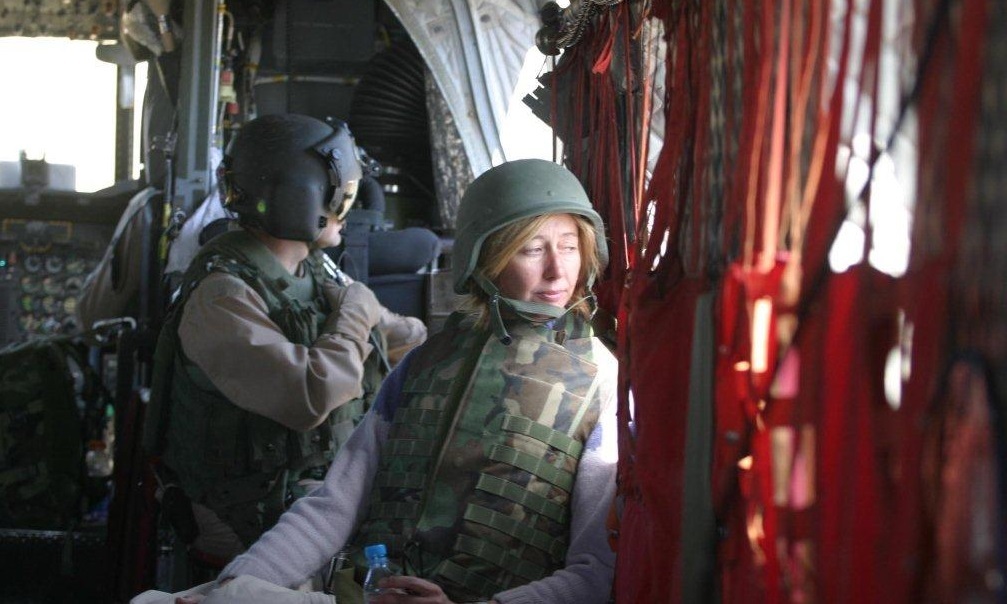Ahead of a lecture at Dundee University, award-winning foreign correspondent Christina Lamb talks about Afghanistan, refugees, and why Britain should learn lessons from its military involvement in the Middle East.
“Have you ever used a pistol?” the sergeant-major yelled amid the Kalashnikov fire and bursts from a machinegun as they ran across a baked-mud field and dived for cover. “If it comes down to it, everyone’s going to have to fight.”
Award-winning journalist Christina Lamb was reporting with the British Parachute Regiment on a ‘hearts and minds’ mission to Southern Afghanistan when this terrifying encounter took place in 2006.
After a meeting with town elders, they were directed to a safe route out of the dwelling.
Soon after they had left, the British were attacked by Taliban fighters.
Lamb describes how for two-and-a- half hours, with no air support, they ran through irrigation trenches under Rocket Propelled Grenades, Kalashnikov and mortar fire from all directions.
As round after round whizzed by sending up clouds of dust, and soldiers discussed among each other about saving bullets for themselves if it became inevitable, Lamb was asked if she had ever used a pistol. Fortunately, they were able to escape before she had to find out if the threat was real.
Lamb, 49, admits that when her son Lourenco was born in 1999, she had to think hard whether life as a war correspondent and lengthy periods away would sit with life as a mother.
But her passion for frontline journalism prevailed, and it’s the sharp end of war reporting that will be the focus on March 19 when she gives the next Dundee University Saturday Evening Lecture, entitled ‘From Kabul to Raqqa: How we have gone from Afghanistan to a more dangerous world’.
The bestselling author and award-winning Sunday Times foreign correspondent will talk about her latest book ‘Farewell Kabul’, the life of a war correspondent and lessons to be learnt from recent political interventions.
Educated at University College Oxford and Harvard University in the USA, Lamb says she always wanted to be an investigative journalist, and often wished she’d lived during the golden age of exploration.
Her journalistic career began as a summer intern at the Financial Times. After an interview with Benazir Bhutto in London in 1987, she began her life as a foreign correspondent in Pakistan. Her early encounters with the Afghan mujaheddin fighting the Russians saw her named Young Journalist of the Year in the British Press Awards in 1988 and she went on to win Foreign Correspondent of the Year five times as well as the Prix Bayeux, Europe’s most prestigious award for war correspondents.
She has been based in Islamabad, Rio de Janeiro, Johannesburg and Washington.
But the place she is most passionate about is Afghanistan.
“I find the place endlessly fascinating, “she said, “and want to keep going back there. It’s sad that news-desks don’t have so much interest in it at the moment. All these people that lost their lives and were injured during the war – I think the public deserve us to remain interested. I’m particularly angered about the role of women there. All sorts of promises were made about the role of women that haven’t been fulfilled.”
Lamb, who was awarded an OBE by the Queen in 2013, hasn’t been to Afghanistan in over a year. But she has had unexpected encounters with many Afghans, now refugees fleeing terror, in places like Hungary.
“When you speak to refugees, whether from Afghanistan, Syria, or wherever, they all have terrible stories, “she said.
”Clearly they can’t all be sent back. But the numbers can’t keep coming into Europe either. I don’t have a clue what the answer is. I feel ashamed of Europe – the way people are being treated. It can’t be beyond the capabilities of Europe to at least have reception centres. We shouldn’t have families sleeping in muddy fields.”
Lamb has written seven books including the bestselling I Am Malala with Malala Yousafzai. The book told the story of Malala the girl who stood up for education and was shot by the Taliban.
“She was amazing. An incredibly inspiring, very human, very warm person to spend time with. And she had a lovely family.”
During her Dundee lecture, Lamb anticipates that she’ll speak for around 40 minutes, followed by a question and answer session. She expects it to be lively.
She reckons the biggest lesson from Britain’s recent involvement in Iraq and Afghanistan is that military intervention, without adequate humanitarian follow-up, does not work.
She added: “With the refugees, some of these wars that seem so far away from our shores don’t seem so far away now. I’m not long back from Northern Nigeria where Boko Haram, the world’s most dangerous terrorist group probably worse than IS have been busy.
“There have never been so many wars to cover as there are now. As a foreign correspondent, I often say ‘When I come to your country, that is not a good a thing!’
For free Saturday Evening Lecture Series tickets visit www.dundee.ac.uk/sels, email events@dundee.ac.uk, call 01382 385108 or visit Dundee University’s Tower Building Reception.
